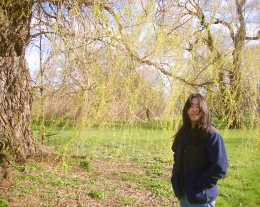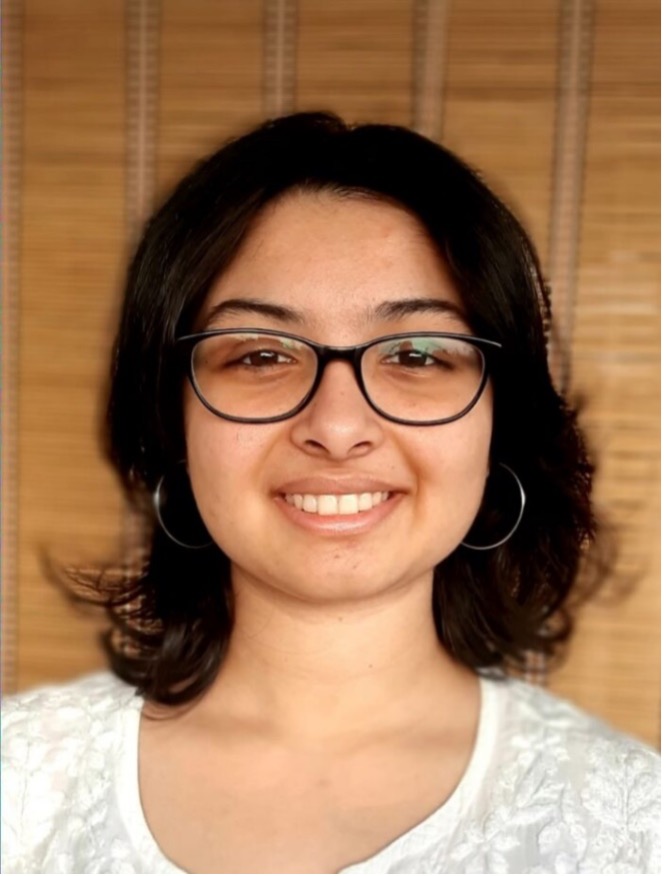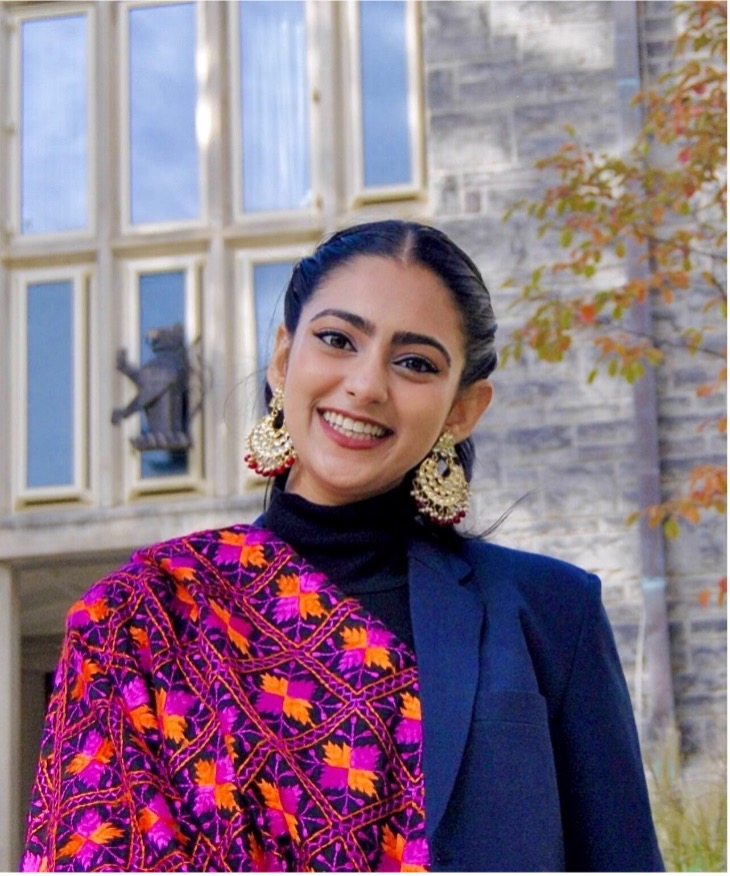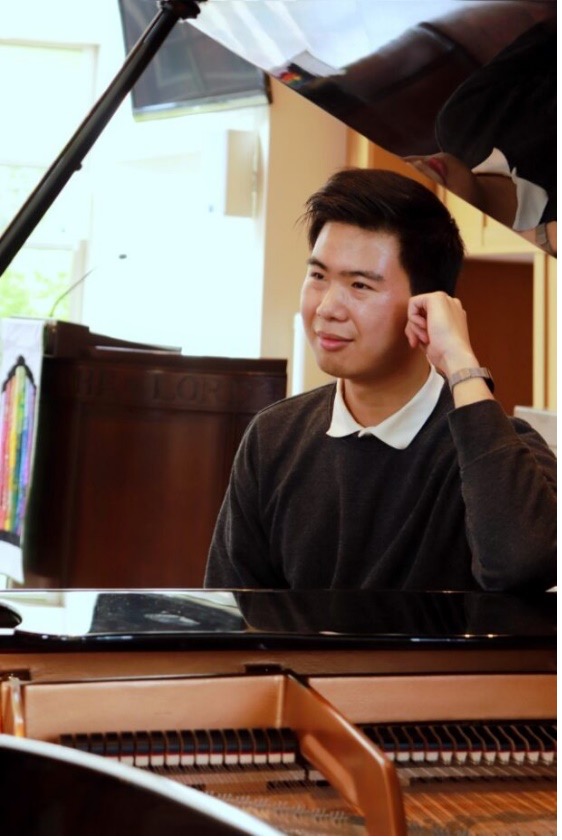The Patricia and Peter Shannon Wilson Undergraduate Research Prize
The Patricia and Peter Shannon Wilson Undergraduate Research Prize is awarded to current undergraduate students enrolled at the University of Toronto during each academic year. The purpose of this prize is to showcase and award students’ effective and innovative use of information sources and the development of their understanding of what it means to be information literate in the 21st century.
Read more about the competition criteria
2024 Prize Winners
Jacqueline Cho
4th year, Woodsworth College, Faculty of Arts & Science
Research project: Double Blind Spots: Contextualizing and Remedying the Historical and Historiographical Marginalization of Queer Asian Americans within Houston, 1970s-1996
Course: HIS476H1, Senior Thesis Seminar
About Jaqueline
 What is your major and expected year of graduation?
What is your major and expected year of graduation?
I am a 4th year Woodsworth College Student double majoring in Criminology and Sociolegal Studies, and History with a Focus in Law and History. I am also completing a minor in English. I will be graduating this June in 2024.
What does it mean to you to win this prize?
This award is an immense honour to receive! This award validates to me that this research is worthwhile, and it is encouraging to know that there is a place and support for this type of research.
What inspired you to choose this research subject?
I was directly inspired by the use of the study and documentation of marginalized histories as a form of community building and activism, as well as an active addition to historiography. My research interests primarily lie in queer histories, diasporic histories, and legal histories, and this topic was the perfect intersection of those interests. When I was doing my initial research into queerness and Asian diasporic activism, what stood out was the geographic dominance of the East and West coasts in existing literature. While this was not particularly surprising or unexpected, I was interested in exploring the intersection of queer and Asian activism in a city with a large Asian population that wasn't as well documented within current literature. I grew up in Texas, and given my personal ties to the region, narrowing my research interests geographically into Houston, a Southern city with a large Asian population that had relatively limited historiography, was the final step of the process that eventually spiraled into what would become this project.
What did you learn about information-seeking, research, and/or libraries while completing your project?
I learned how important such research is not only to the discipline of history, but also as a functional form of activism. Shortly after I travelled to one of the archives within Houston, the LGBT Student Resource Center was closed due to newly implemented Texan legislation. It is not only a privilege to have been able to research and include those materials within this paper, but rather a direct responsibility to ensure that the history of the marginalized are not lost. Additionally, I learned just how accessible some of the available resources were. I had the privilege of being able to consult multiple archives across a variety of platforms and locations both within Houston and Toronto, as well as a variety of digital archives. While some of those I was only able to access through my status as a University of Toronto student, many of the digital archives and even local archives I was able to access just as an independent and private researcher. While academia certainly has leaps and bounds to go to become more accessible, the availability of digital and local archives, such as the ArQuives within Toronto, was comforting to witness and affirmed to me that I would be able to continue to access information even if my formal academic career ended.
Hannah Permaul Flores
3rd year, New College, Faculty of Arts & Science
Research project: Burnout: Changing fire regimes and health effects in Indigenous Amazonia
Course: NEW390Y1, New College Independent Studies
About Hannah
 What is your major and expected year of graduation?
What is your major and expected year of graduation?
I am majoring in Forest Conservation Science, with double minors in Biology and Forest Conservation Studies. I am a member of New College within the Faculty of Arts and Sciences, intending to graduate in 2025.
What does it mean to you to win this prize?
This is the first award that I have ever won for a research project. Winning this award is tangible evidence that if I invest the necessary time and care into a project I am passionate about, my energy input will translate into something impactful. This project has reaffirmed my love for the research process, with all of its many ups and downs, and further solidified my choice to pursue graduate studies upon graduation.
What inspired you to choose this research subject?
My Guyanese and South American heritage inspired me to explore this topic. Marginalized and Indigenous voices must have a majority stake in how we manage the climate crisis, and those living in the Amazon region are no different. I believe that access to clean air, land, and safety is our birthright, and I hope to continue to advocate for human rights in various avenues of the work I do.
What did you learn about information-seeking, research, and/or libraries while completing your project?
Ever since I was very young, I loved books and regular trips to my local library. However, for the longest time, I only saw libraries as stagnant buildings that house books. Since coming to the University of Toronto, I have seen libraries as active hubs and communities. Throughout my project, I learned about all of the resources that UofT libraries have to offer, from writing centres and one-on-one guidance, to archival repositories of maps, and geospatial software. I had everything at my fingertips; all I had to do was reach out and show up.
Anoushka Indira Kapoor
1st Year, New College, Faculty of Arts & Science
Research project: Recommendations to Mitigate Amplification of Vaccine Misinformation on Facebook, YouTube and Twitter
Course: TRN136Y1, Canadian Health Policy in the Global Context
About Anoushka
 What is your major and expected year of graduation?
What is your major and expected year of graduation?
I'm currently a Life Sciences student in the class of 2027 and am affiliated with New College.
What does it mean to you to win this prize?
As an international student aspiring to medical school, this research prize means a lot of different things to me. It has provided some much needed support and has served as a stepping stone to other opportunities.
What inspired you to choose this research subject?
The research paper was the final assignment of my health policy class, and we were asked to find a problem related to health policy and explore some solutions. I was inspired to choose vaccine misinformation after reading Lee McIntyre's 'On Disinformation: How to Fight for Truth and Protect Democracy' which delved into different aspects of misinformation in the world today.
What did you learn about information-seeking, research, and/or libraries while completing your project?
The process of writing this research paper taught me several key things about delving into a research question in general and about the numerous research aids provided by the University of Toronto Libraries. I was able to have a one-on-one session with a librarian to kick off my research and understand how to start tackling it and was able to get in contact with a librarian whenever I hit a roadblock in my paper. The experience was made incredibly exhilarating and rewarding by the various supports provided by the Libraries.
Bhavnoor Kaur Pannu
3rd Year, Trinity College, Faculty of Arts & Science
Research project: A Dual Scoping Review of Factors Causing Misdiagnosis of Cardiovascular Diseases in Women
Course: TRN377Y1Y, Trinity Comprehensive Paper I
About Bhavnoor
 What is your major and expected year of graduation?
What is your major and expected year of graduation?
I am a Trinity College student in the Faculty of Arts and Sciences, at the St. George Campus. I am going into my fourth year of pursuing double majors in Global Health and Physiology and a minor in Critical Studies in Equity and Solidarity, and plan to graduate in June 2025.
What does it mean to you to win this prize?
Winning this prize means the absolute world to me! With my efforts as a budding researcher being validated by reviewers who are library experts at seeking information, I am re-energized to further pursue this project and research in general with newfound confidence and zeal. This award serves as a powerful affirmation that the countless hours, intellectual rigour, and dedication I poured into my research are recognized and valued by the academic community; and that I too can change the world by asking meaningful questions, pursuing challenging problems, and deriving insightful conclusions. The unique application process for this award prompted me to reflect on my personal journey as a researcher, the growth I've experienced in terms of knowledge and skills, and my capacity to overcome obstacles, manage setbacks, and navigate the complexities of the research process. It sparked an even deeper appreciation of the support from mentors, peers, and institutions that have been integral to my success. Winning an award also carries a sense of responsibility to uphold the standards of excellence and integrity in my future work, and use my platform to address societal issues through research. Winning this award is not merely about the accolade itself but about the journey it represents, the growth it signifies, and the future possibilities it heralds.
What inspired you to choose this research subject?
As the sole surviving child of my mother's three pregnancies, two of which ended in miscarriages due to medical misdiagnosis, I developed a profound personal and emotional investment in this social justice issue. My ambition of academically exploring the topic was realized under the unmatched guidance of Prof. Joy Fitzgibbon in TRN377, where I was able to design my own research study to undertake a dual scoping review of factors causing the misdiagnosis of cardiovascular diseases in women.
What did you learn about information-seeking, research, and/or libraries while completing your project?
This research experience has been pivotal in pushing me out of my comfort zone and refining my gross and fine research skills and information-seeking strategies. One of my biggest takeaways is that the people and interpersonal relationships you build in your professional and academic journey shape your work. Data is just numbers; we as researchers have the opportunity, power, and responsibility to stitch the findings critically, productively, and authentically into an impactful story which can change the world. Prof. Fitzgibbon's emphasis on ‘responding compassionately to human suffering’ in her international relations and public policy research, scholarship, and pedagogy made my project into what it is, by inspiring my analytical approach, leading me to view misdiagnosis through a more intentional, introspective, and informed lens. I am grateful for the strong foundation she laid, which guided me in successfully addressing misdiagnosis with empathy and political effectiveness. I learned rigorous search strategies from Heather Buchansky at the Graham Library. It was her dedication and personalized, tailored suggestions, which were pivotal to my project's success. From the Writing Centre instructors, I learnt the power of precise language and intentional writing, transforming my communication skills. From implementing those skills to my advocacy efforts on social media I got feedback from friends, family, strangers on the internet, peers at research conferences, and so on, who all left a mark, elevating my project and my research process. This experience reaffirmed that it truly takes a village to produce quality research; and I rigorously re-learnt the importance of collaboration in academia through this project.
Mehakpreet Kaur Saggu
2nd Year, University of Toronto Scarborough
Research project: Understanding the Impact of Smartphone Screen Time on Adolescent Loneliness: A Comprehensive Analysis
Course: PSYC02H3, Scientific Communication in Psychology
About Mehakpreet
 What is your major and expected year of graduation?
What is your major and expected year of graduation?
I am passionately pursuing a Specialization in Neuroscience (Cognitive Stream) with double minors in Psychology and Applied Statistics at the UTSC, with an expected graduation in 2026. It's a delightful journey filled with exploration and learning, and I'm thrilled to see where it takes me next.
What does it mean to you to win this prize?
Winning the Patricia and Peter Shannon Wilson Undergraduate Research Prize fills me with immense joy and gratitude. It's not just a recognition of my academic achievements but also a celebration of the passion and dedication I have for research and learning. This honor motivates me to continue spreading joy through my work, pushing boundaries, and contributing positively to the fields of neuroscience and psychology.
What inspired you to choose this research subject?
My inspiration to delve into the impact of smartphone screen time on adolescent loneliness stemmed from my involvement in the UTSC's Mental Health Advisory Committee. Through this role, I gained firsthand insights into the significant stressors affecting students, with loneliness emerging as a prominent concern. This, along with recognizing the unmistakable omnipresence of smartphones in our daily lives and their potential influence on mental well-being, I was driven to explore this topic further and contribute to understanding and addressing societal challenges.
What did you learn about information-seeking, research, and/or libraries while completing your project?
Throughout the course of my project, I gained valuable insights into effective information-seeking strategies, research methodologies, and the crucial role of libraries. I learned to navigate vast amounts of literature, refine search queries, critically evaluate sources, and synthesize complex information. Utilizing resources like University of Toronto Libraries, Scopus Journal Analyzer, PubMed, and APA PsycINFO, I honed my ability to access credible and relevant information, enhancing my research skills and understanding of scholarly discourse. This experience deepened my appreciation for the meticulous process of conducting research and highlighted the indispensable support provided by academic libraries in facilitating knowledge acquisition and discovery.
Di (Steven) Zhai
4th year, Faculty of Music
Research project: Anime Music, The Piano, And Animenz: An Exploration of a New and Emerging Genre of Music
Course: TMU499H1, Independent Study
About Steven
 What is your major and expected year of graduation?
What is your major and expected year of graduation?
I recently finished my final year of Bachelor of Music Education at the Faculty of Music. I will be graduating this year in June 2024 during Spring Convocation.
What does it mean to you to win this prize?
I am incredibly honoured and grateful to have received this prize. I feel that it is a recognition of all the hard work I have put into this project. As an incoming Master of Music Piano Performance and Pedagogy student, this award is an indication that I am on the right track as a researcher. It further motivates me to continue researching this topic as I have dreams of studying in Europe for my Doctoral music degree. The topic I researched is not widely known in the academic music community and having the University recognize my work is a great honour. I am thankful for my friends, teachers, professors and parents who have supported me throughout my undergraduate education.
What inspired you to choose this research subject?
I have been fascinated by Anime Music and Anime Piano Music since the 8th grade. During my second year of undergrad, I took HMU323 and wrote my final paper on Anime Music. This experience inspired me to take TMU499 Independent Study. In both of these courses, I discovered early on that there was a lack of academic writing on Anime Music. Anime Piano Music is also a relatively new phenomenon, meaning I would be among the first to discuss it. Due to these reasons, I decided to go big and dedicate almost all of my free time to this project which resulted in a 186-page paper, a 1-hour public presentation and the creation of a research poster for the Faculty of Music Undergraduate Research Showcase. Although it was very exhausting, I wanted to prove that these topics were worthy of further research.
What did you learn about information-seeking, research, and/or libraries while completing your project?
When it comes to researching topics that have very limited academic scholarship, I learned to think outside the box. For example, I attempted to answer some of my research questions indirectly and drew comparisons to what I learned during my classical music training. I also interviewed an Anime Pianist who goes by the alias Animenz and surveyed the Piano Faculty to get their opinions on this phenomenon. In addition to this, I learned to utilize all available sources to flush this topic out as much as possible. This includes primary sources such as published sheet music, personal notes, and video recordings as well as more niche sources such as YouTube video descriptions, Facebook, and Reddit posts. This project has given me a glimpse into what doctoral-level research would be like. I plan to take the experiences and lessons I learned from this and leverage them for future studies.